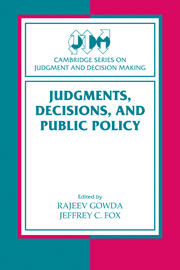Book contents
- Frontmatter
- Contents
- Contributors
- Acknowledgments
- Introduction
- Part I The Fundamentals of Behavioral Decision Theory
- Part II Economic Applications and Contrasts
- Part III Applications to Political and Legal Processes and Institutions
- Part IV Other Policy Applications
- Part V Commentary and Cautionary Note
- 14 The Virtues of Cognitive Humility: For Us as Well as Them
- Index
14 - The Virtues of Cognitive Humility: For Us as Well as Them
Published online by Cambridge University Press: 11 January 2010
- Frontmatter
- Contents
- Contributors
- Acknowledgments
- Introduction
- Part I The Fundamentals of Behavioral Decision Theory
- Part II Economic Applications and Contrasts
- Part III Applications to Political and Legal Processes and Institutions
- Part IV Other Policy Applications
- Part V Commentary and Cautionary Note
- 14 The Virtues of Cognitive Humility: For Us as Well as Them
- Index
Summary
Experimental research on judgment and choice was once an esoteric specialty of a small cadre of cognitive psychologists. To judge just by citation counts, this research program has become psychology's leading intellectual export to the social sciences, as well as to a host of applied fields. The influence of experimental work on judgment and choice has spread (critics might say metastasized) into such diverse domains as behavioral finance, marketing, medical diagnosis, international relations, public opinion, organizational behavior, and the law (Arkes, 1991; Goldstein & Hogarth, 1986; Mellers, Schwarz, & Cooke, 1998; Payne, Bettman, & Johnson, 1992). Scholars with little else in common share a familiarity with foundational concepts and behavioral decision theory such as heuristics and biases, framing and choice, and the psychopsychics of gain and loss functions.
This chapter is, in one sense, testimony to how profoundly successful the heuristics-and-biases research program has been in extending cognitivist concepts into a vast array of disciples. By advancing one ingenious demonstration after another, investigators faithful to the core tenets of the program have converted many sophisticated skeptics to the view that our human limitations as information processors, especially our reliance on simplifying heuristics, produce systematic deviations from rationality across diverse spheres of professional endeavor. The research program thus advances a core scientific value of psychology: the parsimonious reduction of superficial diversity to unifying principles.
Inevitably, though, some skeptics have resisted conversion.
- Type
- Chapter
- Information
- Judgments, Decisions, and Public Policy , pp. 355 - 368Publisher: Cambridge University PressPrint publication year: 2001



